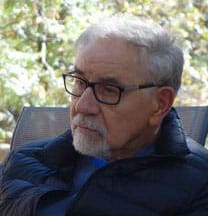If you’re heading down Mexico way, all the way down to Oaxaca, you should know about a bed and breakfast there called Casa Machaya. The name is a sly Jewish reference, a wink at potential clients for the B & B: That’s right, it’s not meant to be the Spanish “ch,” as in “change,” but a guttural “ch,” as in mechaya, Yiddish for “joy.”
“When I was a kid, we’d go out to a lake near Toronto,” said Alvin Starkman, Casa Machaya’s owner and proprietor, “and Grandma Minnie would say, ‘What a mechaya!’ In a rush to come up with a name for the B & B, I remembered Grandma Minnie’s comment, so we called it Casa Machaya.”
Besides running the B & B, Starkman also guides tourists to villages and archeological sites, an abiding interest of his. Fit and energetic-looking in his late 50s, Starkman leans over the balcony of his house, looking down at the B & B unit on a lower floor. He waves to the middle-aged Canadian couple staying there, then takes in the mountains all around and the city rising up dreamlike in the distance. Even though it’s the dry season and the hills are covered with brown grass and shrubs, the landscape still seems magical.
Oaxaca seemed magical to Alvin and Arlene Starkman when they started vacationing here in the early 1990s. They loved it so much that in subsequent years they didn’t vacation anywhere else. At the time they lived in Toronto, Canada, where Starkman practiced law. Little by little, with each subsequent visit, the idea of leaving his law practice and retiring to Oaxaca took root.
When they began to consider settling in Oaxaca, Arlene Starkman, originally from Chicago, contacted the Mexican Jewish Congress, based in Mexico City, to find out about Jewish life in the southern Mexican city. To their surprise, they were told there were no Jews in Oaxaca.
“No Jews in Oaxaca?” Alvin Starkman said. “How could that be? How could a city of 400,000 in the Western world have no Jews? We’d see people wearing a Magen David or we’d see businesses with the name Shalom or Adonai. We’d ask the owner if they were Jewish, but were always told no. Nothing but dead ends.”
However, as time has gone by, the Starkmans have discovered that there are, nowadays, scores of other Jews living in the area: mostly American and Canadian ex-pats, but also Mexico City Jews, often artists, who have settled in Oaxaca, a place teeming with art galleries and indigenous crafts.
But they’ve also discovered that — in spite of their initial inquiry about Jewish life in Oaxaca — they prefer not to go out of their way to befriend ex-pats, Jewish or not.
“Having Judaism in common, or being American or Canadian, is not enough to establish a friendship,” Starkman said. “I didn’t want to get sucked up in a relationship with people just because they happen to speak English or happen to be Jewish.”
During the years, their stays in Oaxaca grew longer and longer, until in early 2004 the Starkmans bid goodbye to Toronto — where their daughter was starting college — and settled for good in southern Mexico. By then they had many friends in Oaxaca, nearly all of them Mexican and Catholic. When they celebrate Jewish holidays at their house, they invite their local non-Jewish friends to join them.
How do the Starkmans’ Oaxacan friends feel about their being Jewish?
“The fact is,” Starkman said, “the local population simply has not had enough contact with Jews for there to be any significant amount of anti-Semitism.”
That changed, however, during the unrest in 2006; demonstrations turned violent and, more than two-dozen people were killed. That occurred at the same time as the war against Hezbollah, so the Middle East war was conflated with local problems.
“During that period in 2006,” Starkman said, “there were outside agitators here stirring the pot. These people were also responsible for some anti-Israel graffiti as a result of the Lebanese war. My daughter was visiting here, and one day I got a call from her. She was with local friends, in the center of town, and saw an anti-Semitic poster. She decided to tear the poster down and her friends helped her.”
Is Starkman happy with his decision to live out the rest of his life in Oaxaca?
“I don’t harbor any serious doubts,” Starkman said. “Maybe, sometimes, for a fleeting moment…. And then you think, ‘Look what I have here, retired and healthy in my 50s, doing what I want…. How can you compare slugging away doing family law to touring clients in the mountain regions of southern Mexico, taking in the sun, sampling mescal [local cactus liquor], and being welcomed into villagers’ homes?'”
For more information about Casa Machaya, contact Alvin and Arlene Starkman at oaxacadream@hotmail.com or visit
Did you enjoy this article?
You'll love our roundtable.
Editor's Picks



What Ever Happened to the LA Times?

Who Are the Jews On Joe Biden’s Cabinet?


No Labels: The Group Fighting for the Political Center
Latest Articles

Israel Strikes Deep Inside Iran

NSFW – A Poem for Parsha Metzora

Israel War Room Launches in Spanish

Modern Book Bans Echo Past Atrocities and Further Silence Marginalized Voices

The Power of the Passover Seder to Unite Jews












 More news and opinions than at a Shabbat dinner, right in your inbox.
More news and opinions than at a Shabbat dinner, right in your inbox.